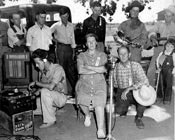| |
|||
|
home >> about
the center >> folklife in your state >> oklahoma
OklahomaThe American Folklife Center was created in 1976 by the U.S. Congress through Public Law 94-201 and charged to "preserve and present American folklife." The Center incorporates the Archive of Folk Culture, which was established at the Library of Congress in 1928, and is now one of the largest collections of ethnographic material from the United States and around the world. CollectionsThe collections of the American Folklife Center include vast amounts of material documenting the Native American traditions of Oklahoma. Represented in its unique recordings are Kiowa, Sioux, Pawnee, Ponca, Comanche, Cheyenne, Arapaho, Shawnee, Kiowa-Apache, Osage, Kickapoo, Cherokee, Delaware, and other tribal groups. In addition to native traditions, the Center's collections include cylinder recordings of Oklahoma cowboy music from the early 1900s recorded by John A. Lomax; unique recordings of performances and interviews by the legendary folk musician and Oklahoma native son Woody Guthrie and a collection of Guthrie's manuscripts; and the "Indians for Indians Hour" radio programs. The online presentation, Voices from the Dust Bowl: The Charles L. Todd and Robert Sonkin Migrant Worker Collection includes oral histories, songs, and stories collected from people who moved from Oklahoma to California as a result of the dust bowl in the early 1940s. Of particular interest is Mrs. Myra Pipkin, whose family homesteaded in Shawnee, Oklahoma in 1898 (see photo). She had an extensive repertoire of ballads and songs, many of which were documented by the collectors. Mrs. Pipkin is thought by some to have been the prototype for "Ma Joad" in the Grapes of Wrath.
The online presentation, Woody Guthrie and the Archive of American Folk Song includes correspondance between Guthrie and the Archive of Folk Song (now the Archive of Folk Culture) between 1940 and 1950. Oklahoma participated in the Library's Bicentennial Local Legacies project, which includes documentation of local traditions and celebrations for the American Folklife Center's Archive of Folk Culture. Published Recordings
|
| |||

